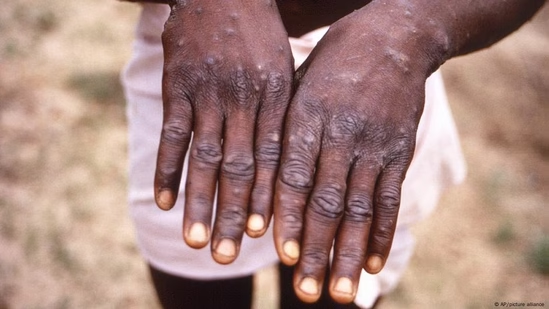Mpox: NCDC places Lagos, Abuja, other states on high alert
The Nigeria Centre for Disease Control and Prevention (NCDC) has said that some states of the country have been put on high alert for the Mpox outbreak. The director general of the agency, Dr Jide Idris, said the states include Lagos, Abuja, Enugu, Kano, Rivers, Cross-River, Akwa-Ibom, Adamawa, and Taraba. He disclosed this on Thursday […]

mpox
The Nigeria Centre for Disease Control and Prevention (NCDC) has said that some states of the country have been put on high alert for the Mpox outbreak.
The director general of the agency, Dr Jide Idris, said the states include Lagos, Abuja, Enugu, Kano, Rivers, Cross-River, Akwa-Ibom, Adamawa, and Taraba.
He disclosed this on Thursday while briefing newsmen on the Mpox outbreak on the continent and cholera outbreak in Nigeria.
The World Health Organization (WHO) and the Africa Centers for Disease Control and Prevention (ACDC) had both declared Mpox a Public Health Emergency of International and Continental Concern (PHEIC/PHECC).
Idris said so far, about 2,863 confirmed cases and 517 deaths across 13 African countries of Mpox had been reported in 2024 alone.
He said this alarming increase is linked to a new strain of the Mpox virus which emerged in eastern Congo and has since been detected in Kenya, Rwanda, and Uganda.
He also said that in Nigeria, cumulatively, a total of 39 confirmed cases and zero deaths have been recorded across 33 States + the Federal Capital Territory ( FCT) from the beginning of the year 2024.
He said the recorded cases in states leading the pack are Bayelsa (5), Cross River (5), Ogun (4), Lagos (4), Ondo (3), and Ebonyi (3).
He said that the National Mpox Technical Working Group (TWG), a multi-sectoral body housed within the NCDC, continues to coordinate Mpox response activities.
He said: “As part of the government’s ongoing efforts, we are intensified surveillance across Nigeria to swiftly detect and respond to any new cases. This putting all port health services across all 5 international airports, 10 seaports, and 51 land/foot crossing borders on high alert.
“Diagnostic protocols according to the IDSR are now distributed to these locations and port health officers are on high alert and screening for suspected cases.”
Dr Idris further said that NCDC is also conducting contact tracing and monitoring for confirmed cases to prevent further spread, adding that this will now also include declaration by travellers who have been to any of the countries where there is an ongoing outbreak of Mpox in the last 90 days.
“Additionally, we continue to provide healthcare workers and the public with updated guidance on infection prevention and control measures and train SURGE staff as part of our preparedness and readiness for an MPX public health event.
“The NCDC is also notifying public and private hospitals about the MPX alert and sending a list of referral isolation/treatment centers across the 6 geopolitical zones and reference laboratory networks,” he stated.
He added that the federal government was also considering vaccination efforts for high-risk groups, as Nigeria expects to receive 10,000 doses of the Jynneos vaccine.
Mpox is a rare viral zoonotic infectious disease (i.e., disease of animals transmitted from animals to humans) that is endemic in several African countries including the tropical rainforests of Central and West Africa. The exact reservoir of the virus is still unknown although rodents, squirrels and monkeys are suspected to play a part in transmission.
The Mpox virus can spread both from animal to human and from human to human.
The NCDC boss also said that cumulatively, as of 11th August 2024, a total of 5, 951 suspected cases and 176 deaths from cholera have been recorded across 36 States and the FCT with a case fatality rate of 3.0%.
While saying this data reflects a continued increase in the number of cases being recorded across the country, so far, he said the most affected age groups are less than five years.
He said the trend of suspected cholera cases is anticipated to exhibit fluctuations and may persist until Epidemic Week 37.
“This projection is consistent with the patterns observed in cholera outbreaks in Nigeria from 2020 to 2024. The current rainfall forecasts suggest that there may be an increase in the number of cases. Contributing factors to the outbreak include high rates of open defecation, which lead to contamination of water sources through the runoff of fecal matter.
“In response, we will enhance both prevention strategies and case management measures to effectively address and mitigate the outbreak,” he added.
